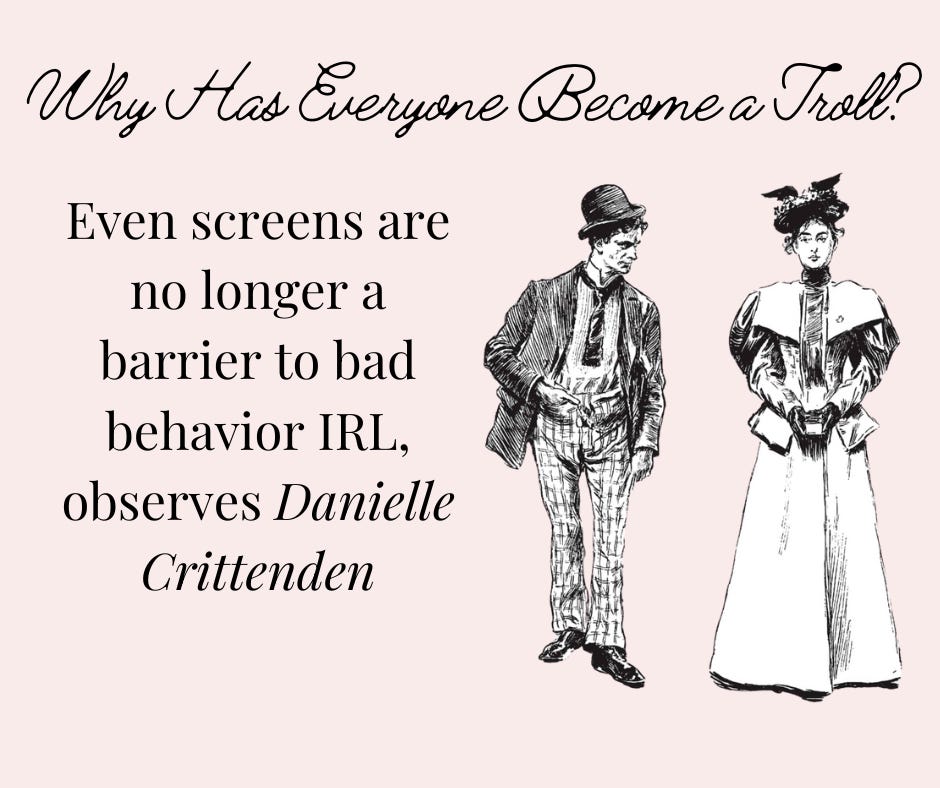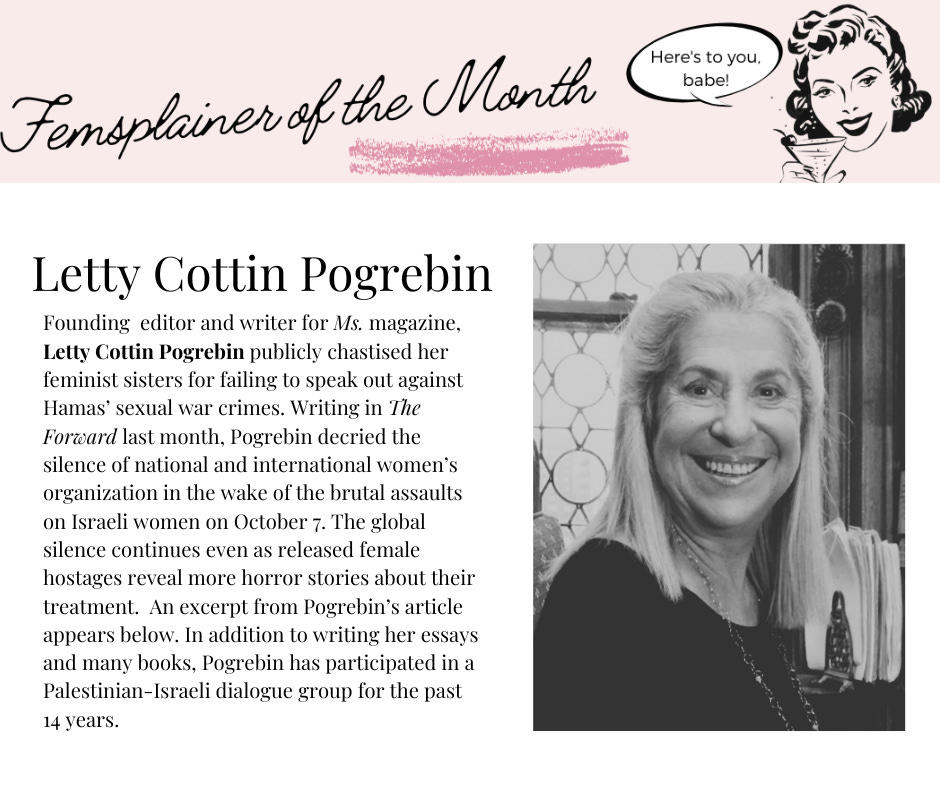January 2024
MANY YEARS AGO, I decided to break all rules of good sense and reply to an Internet troll.
At the time, my husband David was running an opinion/news website — “FrumForum” — out of our garage. My role was to teach our young staff how to write a snappy headline and lead paragraph.
One afternoon, our diligent and kindly managing editor sighed audibly.
“What is it, Meg?” I asked. Meg was his nickname.
“Take a look.”
I leaned over Meg’s shoulder to read his computer. It was an email from a reader.
“Tell David Frum he is a @#$^^! and #^&())&!!! and should go F*** himself …” the email began.
The writer went on for several paragraphs in that unprintable vein. It was signed (I’m making the name up here), “Gary MacIntyre, Flyover Country, USA.”
David was accustomed to receiving this kind of helpful feedback to his posts, so I wasn’t sure why Meg decided to show this particular one to me.
“Definitely a dick,” I said.
“Seriously,” Meg replied. “I mean, what kind of idiot signs his name to something like this? And who would expect a pharmacist in” - I’m going to alter the placename too -“Eldora, Iowa to send an email using this kind of language?!” Meg shook his head sorrowfully.
“What do you mean by ‘pharmacist in Eldora, Iowa?’”
“That’s who he is,” Meg said. “I found him. He works at the Walgreens there.”
Meg was capable of extraordinary internet sleuthing — which served the site well when we were trying to verify a quote or track down a source. But locating a pharmacist in the midde of the vast United States with no other clue but “Flyover USA” was the work of a master detective. “Are you sure?”
“Positive.”
By now Meg had the attention of the rest of the staff, who clustered around his desk to marvel at his achievement as well.
“I have an idea,” I said. “Let’s give this MacIntyre guy a call.”
Meg found the number for the Walgreens, I dialed it on speaker so everyone in the office could hear. A receptionist put us through to the pharmacy.
A male voice answered.
“Hello, is this Dr. MacIntyre?” I asked politely.
There was a modest chuckle. “Oh, I’m not a doctor. I’m just a pharmacist.”
“Let me correct that,” I replied. “And do you spell ‘MacIntyre with an M-C or M-A-C?’”
“I beg your pardon?”
“Sorry, I’m a fact checker at FrumForum, Mr. MacIntyre. You recently sent a Letter to the Editor and it’s my job to make sure we have everything correct before we publish it.”
There was a stunned silence. Then the man stammered, “I didn’t send that as a Letter to the Editor —”
“Let me read it back to you,” I interrupted. “I want to make sure it’s expressed accurately and as you intended.”
I began to recite the email exactly as MacIntyre had written it, but in the straightforward, professional manner of a research assistant, pronouncing every expletive and insult in full, occasionally pausing to clarify such things as, “Did you mean to use the term $%#!! twice?”
Meanwhile MacIntyre was audibly growing hysterical with worry. He kept interjecting, “That was a PRIVATE email!” and “I didn’t intend for it to be published!” and “You can’t print it!”
“But why not?” I finally asked him. “Mr. Frum very much believes in giving voice to his critics and encouraging debate on the site. If you didn’t want it published, why did you send it?”
“It was PRIVATE!” he repeated with horror. “You can’t publish it!”
“I’m sorry you feel that way, Mr. MacIntyre. However, as I said, Mr. Frum takes his critics seriously. If you have no further corrections, I’ll let you go. Thank you for your time. Your letter will be posted within a week.”
Then I hung up. The staffers burst into laughter and a round of applause.
“That’s someone who’s not getting a good night’s sleep any time soon,” I said.
MUCH OF THE “rise in incivility,” as it’s being called, is blamed on the fact that many fewer people today are interacting in person rather than online. So long as we are invisible characters behind screens, we feel we can act with impunity. Maybe that poor pharmacist was perfectly polite to his customers by day. When he went home and sat in front of his computer, possibly with a drink in hand, he felt free to unleash all his pent-up opinions. When my phone call pierced the screen, he became unhinged. It was as if an actor suddenly walked off a stage in the middle of a play, strode over to seat G16, pointed at the non-applauding member of the audience occupying it, and declared, “I don’t give a fuck what you think of my performance.”
Post-pandemic, the situation has dramatically worsened. It’s as if the trolls are piercing the screens themselves rather than taking cover behind them — or to continue the above metaphor, the audience members are now leaping onto the stage and punching the actors in the face.
Frontline workers — such as those who work in customer service, retail, hospitality, airlines, etc. — report an enormous rise in rude encounters with the public. A 2022 survey of 2,000 people in more than 25 industries around the world revealed that 76% of frontline workers experience incivility at least once a month. 70% suffer it at least two to three times a month. The survey, published in the Harvard Review of Business, is the latest conducted by Christine Porath, professor of management at Georgetown University. Porath has studied public incivility for more than two decades. She reports that 78% of frontline workers believe that bad behavior from customers toward employees is more common than it was five years ago; 66% believe bad behavior from customers toward other customers is more common than it was five years ago.
But you don’t need studies to confirm what even we non-frontline workers encounter seemingly every day. It makes me sad, for example, that airline pilots now feel the need to add to their general welcome a warning to passengers to behave properly and be polite to the flight crew, as if we were all sixth-graders about to embark on a field trip.
Of course there are many factors contributing to this breakdown in civility. Porath’s research points to ones you’d expect, including — and especially — the influence of digital technology on the way we interact (or don’t) with others.
It was a trend before 2020 but our mass isolation during the pandemic made it exponentially worse. Still, with the resumption of normal life — nearly four years after the initial lockdowns — civility should be returning. Except that it isn’t.
What’s driving the deterioration? I believe it’s the current mass resistance to going back to the office.
As much as people have been willing to resume their social lives, activities, and travel, their unwillingness to return to the workplace on a regular basis contributes to what Porath calls “a general fraying of community and workplace relationships” — with community being defined as “as a group of individuals who share a mutual concern for one another’s welfare.”
And it’s not just Gen Z underlings who are balking. According to this Stanford study, “Almost 20 percent of employees that can WFH [work from home]— typically professional and managerial employees — were not coming into the office as many days as their employer requested.”
Some firms like Grubhub and Qualcom have resorted to free food and wine tastings; others like Google have hired performers like Lizzo to entice workers in; some, including Tesla, have resorted to threatening to dismiss employees who don’t show up.
Don’t get me wrong: I hate soulless cubicles and pointlessly long meetings as much as the next person. One of the upsides of the pandemic was realizing how much could be accomplished by individuals working remotely. For all the pre-stated downsides of technology, it’s sad it took a global epidemic to incorporate many of technology’s potential human benefits, especially for parents. In the 1990s, we dreamed of — begged for — flexible schedules and the ability to do some of our work from home. That was the era of the so-called Mommy Wars, when you had to choose between quitting your job entirely or parking your newborn in full-time daycare after six weeks of maternity leave.
But we overrate “face time” at the risk of under-rating it. During the years I spent working in offices, yes, I endured stupid office politics. I often wished I could press a mute button on the “Brads” who made their perfectly obvious points at ridiculously great length. I even swatted away a few “MeToos” before there was #MeToo.
But I also greatly enjoyed the conviviality of sharing a workplace and the spirit of being part of a joint mission. I loved hanging out with the different generations of writers and editors who came through the garage office of FrumForum. We hatched creative ideas together that would not have come about had we been sitting at home in our pajamas talking to the cat. It was nice to exchange casual words in passing — “Did you watch the game last night?” “How was your vacation?” — or repair for a drink after work. Our co-workers were not boxed faces in two dimensions. They were living, breathing, fully-limbed people of all shapes, sizes and colors, with whom you discovered unexpected mutual interests or whose humor you enjoyed. Without these seemingly trivial, daily interactions there can be no workplace community; no “group of individuals who share a mutual concern for one another’s welfare.”
And certainly Gary MacIntyre of Eldora, Iowa, would never have learned his particular lesson in civility. Deprived of the audience of Meg and the other employees of FrumForum, I never would have pranked him on my own.
I DON’T HAVE any sweeping theory as to how we can get people back to work (hell, if wine tastings and Lizzo don’t work, what more can be done?!). I can only offer suggestions as to what we can do as individuals.
If each of us made a New Year’s resolution to step out of our screens more, that would be a start. By stepping out, I mean making deliberate efforts to connect with others, even if the effort is as trivial as looking baristas and cashiers in the eye and acknowledging their work (versus looking down at one’s phone through the entire exchange).
Ask yourself: During an average day, how often do you have a meaningful exchange with someone you don’t know or know slightly (such as a neighbor)? Or let’s make it easier: a brief exchange of pleasantries?
In my case it’s pretty low. If I shop, I do it online or use the self-checkout line. When I walk our dogs, I always try to summon a hello or nod to passersby — but most of the time the other person is wearing headphones and doesn’t notice or looks at me like I’m a complete weirdo.
Persisting with these gestures matters, though. I once read about a flight attendant who said how small but important it was to the crew that passengers said goodbye/thank you as they exited the plane. I now make a habit of always doing that.
By stepping out, I also mean treating others kindly and respectfully as people, not as avatars. Sometimes it’s hard to remember the difference. In our cars, too, we exist behind screens. My house is served by a perilous driveway exiting onto a busy street. During rush hour it’s a nightmare to pull out. Cars race past, cars stack up. But if I roll down my window and wave or make eye contact, a driver will usually let me in. It’s as if suddenly we’re people again: Hey, you’re not just a disembodied reflection. I see you!
The other resolution we can make is to be better people even behind the screens of our devices — to remember that every belligerent comment we make or shitty review we leave has an impact on actual human beings. It’s sometimes just a matter of reminding people — like the hapless pharmacist in Iowa — that their uncivil behavior can have real world consequences.
After all, you never know who’s going to find you one day.
I DESPISE HAMAS for starting the war. I’m sad that the Palestinians rarely get the leaders they deserve.
At the same time, as a Jew and as a woman, I refuse to let Hamas’ brutal assault on Israeli women and girls be forgotten in the fog of war. I feel obligated to describe every violent act committed by Hamas on Jewish female bodies since Oct. 7, lest the erasure of those unpleasant “details” facilitates the terrorists’ campaign to rebrand themselves as “freedom fighters.”
Some people are in denial. Rapes didn’t happen, they say; Israel faked the murders. Others accept the facts but are chillingly dismissive of the victims, calling the rape and sexual violence committed against Jews the unavoidable byproduct of a noble rebellion.
You’d think it a no-brainer for decent people, regardless of their political views, to instantly and unequivocally condemn the unspeakable atrocities carried out by Hamas on Oct 7. If no one else, certainly, the feminist community should have been quick to denounce the men who perpetrated such horrific acts against hundreds of Israeli women and girls.
But to their everlasting shame, many of my feminist “sisters” have turned a blind eye to these “incidents” even as unimpeachable evidence, including survivors’ testimony and footage from Hamas body cams, has mounted. The devil is literally in the details, and the diabolical terrorists advertised their own evil.
The “details” include multiple gang rapes, sexual mutilation and abject humiliation, and the desecration of the corpses of murdered women and girls.
If you know women who have been brandishing one of those antisemitic pro-Hamas signs in the misguided belief that it conveys their support for Palestinian freedom, ask them if they themselves would be willing to be governed by militant Islamic fundamentalists whose ideology is larded with violent misogyny, Jew-hatred, homophobia and male supremacy, and whose leaders are capable of beheading men, shooting defenseless women and raping girls. ~Letty Cottin Pogrebin
Wishing everyone a happy, healthy, and above all, peaceful New Year! Thank you for subscribing to this newsletter. If you like it, please don’t hesitate to share widely! See you in February.








Thank you for this wonderful article. For several years now, my goal is to have what I call a real human interaction with everyone I meet. So if I am being cashed out at the grocery store, I will ask how they are, and I will actually mean it. It’s a small gesture, but almost everyone reacts in a surprised but thankful way. As a supervisor of people in a retail store, I encourage my staff to treat others likewise.